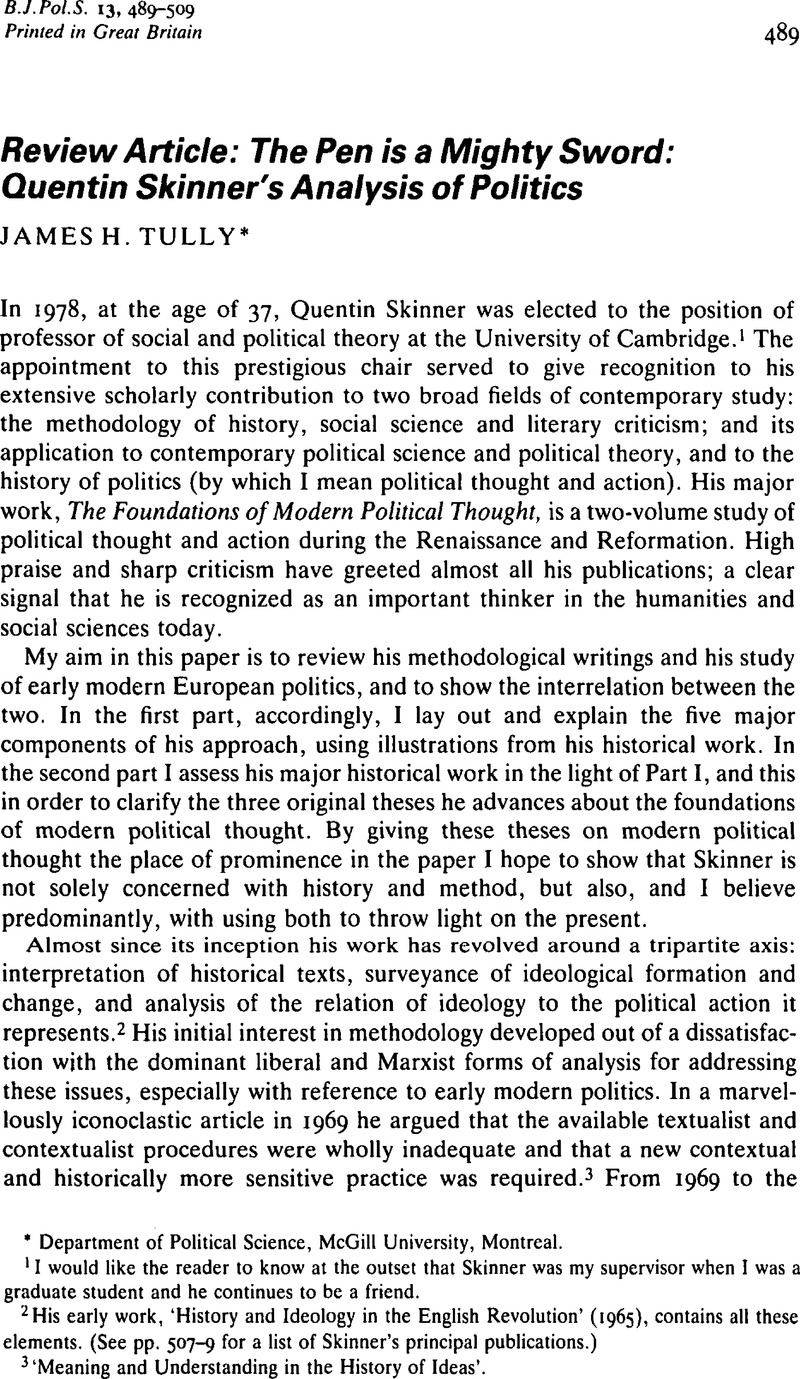Article contents
The Pen is a Mighty Sword: Quentin Skinner's Analysis of Politics
Published online by Cambridge University Press: 27 January 2009
Abstract

- Type
- Review Article
- Information
- Copyright
- Copyright © Cambridge University Press 1983
References
1 I would like the reader to know at the outset that Skinner was my supervisor when I was a graduate student and he continues to be a friend.
2 His early work, ‘History and Ideology in the English Revolution’ (1965)Google Scholar, contains all these elements. (See pp. 507–9 for a list of Skinner's principal publications.)
3 ‘Meaning and Understanding in the History of Ideas’.
4 For his adaptation of speech–act theory, see the second through to the ninth article under Interpretation and Explanation in the bibliography.
5 For Habermas, Jurgen, see ‘What is Universal Pragmatics?’ in Communication and the Evolution of Society, tr. McCarthy, Thomas (Boston: Beacon Press, 1979).Google Scholar
6 ‘“Social Meaning” and the Explanation of Social Action’, p. 146.Google Scholar
7 ‘Social Meaning’, pp. 144–5, 154–5Google Scholar; The Foundations of Modern Political Thought, I, p. xii.Google Scholar
8 See Machiavelli, pp. 31–48Google Scholar; Foundations, I, pp. 180–6.Google Scholar
9 See especially, ‘Conventions and the Understanding of Speech Acts’. (Let ‘text’ stand for any linguistic unit of analysis.)
10 ‘Social Meaning’, p. 154.Google Scholar
11 ‘Social Meaning’, p. 145.Google Scholar
12 Foundations, I, p. xiii.Google Scholar
13 ‘Social Meaning’, p. 142.Google Scholar
14 ‘Social Meaning’, p. 146.Google Scholar
15 ‘Some Problems in the Analysis of Political Thought and Action’, p. 287.Google Scholar
16 ‘Meaning and Understanding’; pp. 33–5Google Scholar; ‘Social Meaning’, p. 155Google Scholar; ‘Some Problems’, pp. 288–9.Google Scholar
17 Foundations, I, p. xi.Google Scholar
18 Foundations, I, pp. 113–39.Google Scholar
19 Foundations, I, p. 9.Google Scholar
20 See ‘Some Problems’, pp. 289–301Google Scholar; and especially ‘Language and Social Change’.
21 ‘Language and Social Change’, p. 576.Google Scholar
22 ‘Language and Social Change’, p. 576.Google Scholar
23 ‘Some Problems’, p. 294.Google Scholar
24 This explicitly Weberian theme is analysed from the perspective of the legitimating agent in ‘Some Problems’ and from the perspective of the legitimating role of the language in ‘Language and Social Change’.
25 ‘Some Problems’, pp. 299–300.Google Scholar See ‘The Principles and Practice of Opposition’, for a case study.
26 Foundations, I, pp. xii–xiii.Google Scholar
27 Foundations, II, p. 64.Google Scholar
28 ‘Some Problems’, pp. 294–5.Google Scholar
29 ‘Language and Social Change’.
30 Foundations, II, pp. 20–113.Google Scholar
31 Foundations, I, p. xi.Google Scholar
32 The exception is John Dunn, who alone saw clearly the challenge Skinner had launched at modern political theory. Dunn, John, ‘The Cage of Politics’, The Listener, 15 03 1979.Google Scholar
33 Foundations, I, p. ix.Google Scholar Not precisely our concept of the state, he carefully notes.
34 Foundations, II, pp. 349, 358.Google Scholar
35 Foundations, I, IIGoogle Scholar, back cover of paperback edition.
36 ‘Some Problems’, p. 281.Google Scholar
37 This conclusion of Foundations is taken up more recently in Machiavelli and Liberty, an unpublished manuscript.
38 Foucault, Michel, ‘Lecture Two: 14 January, 1976’, in Gordon, Colin, ed., Power/Knowledge (New York: Pantheon, 1980), pp. 92–108.Google Scholar
39 In Machiavelli and Liberty, Skinner pits the old republican humanist ideology against recent manipulations of the juridical ideology, including John Rawls's A Theory of Justice.
40 Foundations, II, p. 347.Google Scholar
41 This is summarized in four major steps in the Conclusion of Foundations, II.Google Scholar
42 Foundations, II, pp. 302–49Google Scholar; ‘The Origins of the Calvinist Theory of Revolution’.
43 ‘Meaning and Understanding’, p. 53.Google Scholar
44 Foundations, I, pp. 86–9.Google Scholar
45 Foundations, I, pp. 69–112.Google Scholar
46 ‘Language and Social Change’.
47 See ‘Meaning and Understanding’ for exposure of several instances of this, especially pp. 51–2.Google Scholar
48 Wittgenstein, Ludwig, Philosophical Investigations, 10Google Scholar and On Certainty, 204–5.Google Scholar
49 Taylor, Charles, ‘Interpretation and the Sciences of Man’, in Dallmayr, F. R. and McCarthy, T. A., eds, Understanding and Social Inquiry (Notre Dame: University of Notre Dame Press, 1977), p. 117Google Scholar; Gadamer, Hans-George, Truth and Method, tr. Glen-Doepel, William (London: Sheed and Ward, 1979), pp. 345–431.Google Scholar
50 Foundations, II, pp. 347–8Google Scholar; cf., Foucault, , ‘Lecture Two’, p. 103.Google Scholar
51 von Clausewitz, Carl, On War, ed. Rapoport, A. (Middlesex: Penguin, 1974), p. 402.Google Scholar
52 Foucault, Michel, ‘Truth and Power’, Power/Knowledge, p. 114.Google Scholar
- 18
- Cited by


